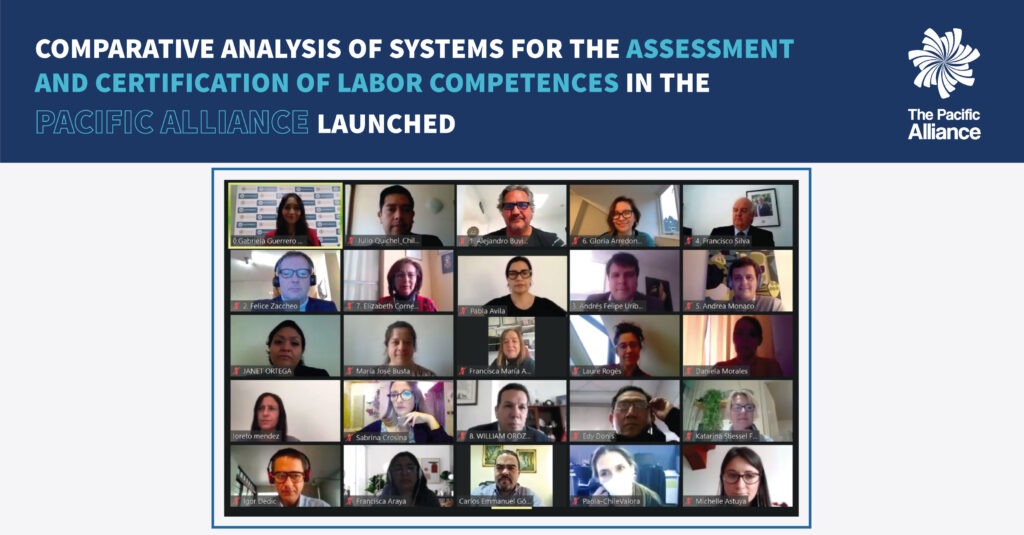December 1, 2020. Today was the launch of the Comparative Analysis of Systems for the Assessment and Certification of People’s Labour Competences in the Countries of the Pacific Alliance, where nearly 120 people participated, representatives of different public and private entities from Chile, Colombia, Mexico and Peru, as well as delegates from the EuroSociAL+ Programme and representatives from the European Union.
The presentation of this Comparative Analysis is the result of the fulfillment of the commitments acquired by the Technical Labor Group (GTL, by its acronym in Spanish) of the PA in the Lima Declaration signed in the framework of the XIV Presidential Summit, held in July 2019. On that occasion, the labor mandate was established to “prepare a comparative report on labour skills assessment and certification systems in the countries of the Pacific Alliance, as a first step towards the development of a roadmap to standardize the certification systems”.
To carry out this task, a Network of Experts in the certification of labor competencies was created within the GTL, made up of representatives from the Commission of the National System of Certification of Labor Competencies of Chile, ChileValora; the National Learning Service of Colombia, SENA; the National Council for Standardization and Certification of Labor Competences of Mexico, CONOCER; and the Ministry of Labor and Employment Promotion of Peru; which has received technical and financial support from EuroSociAL+ to prepare this report.
At the opening of the event, jointly organized by the GTL, its Network of Experts in Certification of Labour Competences and delegates from the EuroSociAL+ Programme, authorities representing the pro tempore presidency of the Pacific Alliance and the European Commission highlighted the importance of multilateralism and international cooperation within the Alliance.
Subsequently, the Vice Minister of Employment and Pensions of the Ministry of Labor of Colombia, Andrés Felipe Uribe, and the Executive Secretary of ChileValora, Francisco Silva Bafalluy, referred to the importance of the Homologation of Labor Certifications for the Development of the Pacific Alliance, taking into account the challenges within the Alliance to promote labor mobility and create strategies that facilitate labor insertion or continuity of studies in the countries of the Alliance.
Next, the representatives of the EuroSociAL+ Programme, Andrea Carlo Monaco, senior technician of the Social Policies Area of the EuroSociAL+ Programme, and Gloria Arredondo, one of the consultants hired by this entity for the development of the study, presented the main conclusions and recommendations of the Comparative Analysis, understanding that the development of this initiative contributes to the objective of the Alliance to achieve the free transit of people, in particular from the labor area, since it will facilitate mobility within the labor markets, improving the conditions of income and recognition of work experiences.
Taking into account the growing intraregional migration in Latin America, which is largely due to labor reasons, and the impacts of the pandemic on the world of work, Rodrigo Rojas Navarrete, General Director of CONOCER of Mexico, and Elizabeth Cornejo Maldonado, Director of Standardization and Certification of Labor Competencies of the Ministry of Labor and Promotion of Employment of Peru, commented on the challenges for the certification systems for the countries of the Pacific Alliance, specifically the importance of creating conditions for migrants to have their labor and professional skills recognized, as an instrument to facilitate their labor insertion and/or the continuity of studies in the destination countries.
Finally, the Director of the National System of Training for Work of SENA Colombia, William Orozco, closed the event by talking about the future perspectives of national competence certification systems and the importance of continuing the work of the Network of Experts in benefit of the articulation of the certification systems of the four countries.
PACIFIC ALLIANCE PPT COMMUNICATIONS

